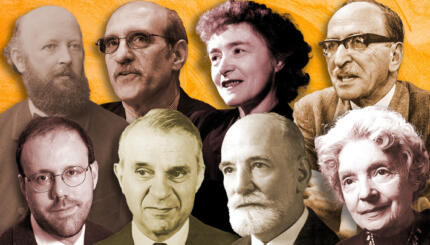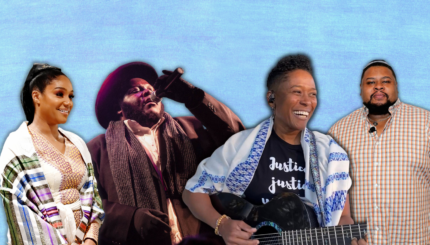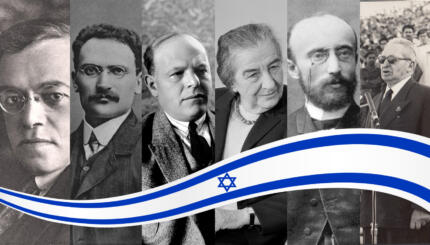Israel’s Supreme Court is internationally known as the bulwark of civil and human rights in the country’s democracy. On numerous occasions it has used its muscle to scale back the initiatives of Israel’s legislature and executive branches. But it has taken decades for Israel’s top court to gather this power and stature.
No Constitution
The main reason for this gradual build-up of stature is the absence of a constitution. In the country’s seminal legal document, the May 1948 Declaration of Independence, Israel’s founders called for the drafting of a constitution within a half year. But in the ensuing chaos of the country’s struggle to fend off invading Arab armies, the deadline passed.
Two years later, lawmakers fought bitterly over the nature of a potential constitution. Secular representatives wanted the document to reflect the legal values of Western liberal democracies, while religious lawmakers insisted that the and halakhic (Jewish legal) tradition should serve as the basis for the legal system of the Jewish state. Failing to reach a consensus, the lawmakers decided the constitution would be constructed gradually, in a piecemeal fashion.
 They did this through establishing a special type of legislation known as “Basic Laws.” This type of legislation takes precedence over everyday laws, and these laws can only be changed by a special majority. It was envisioned that the Basic Laws would eventually acquire the force of a constitution, but for the time being, they would have a quasi-constitutional force: stronger than regular laws but weaker than a formalized constitution.
They did this through establishing a special type of legislation known as “Basic Laws.” This type of legislation takes precedence over everyday laws, and these laws can only be changed by a special majority. It was envisioned that the Basic Laws would eventually acquire the force of a constitution, but for the time being, they would have a quasi-constitutional force: stronger than regular laws but weaker than a formalized constitution.

Help us keep Jewish knowledge accessible to millions of people around the world.
Your donation to My Jewish Learning fuels endless journeys of Jewish discovery. With your help, My Jewish Learning can continue to provide nonstop opportunities for learning, connection and growth.
So, while the Basic Laws were put in place to organize various branches of government almost immediately, Basic Laws establishing a series of constitutional values like the ones enshrined in the U.S. Bill of Rights were delayed.
Today the Supreme Court has 14 members, though the number has been as low as 10 in the past. The judges are appointed for life but are required to retire at 70. In the effort to divorce politics from the appointment process, the justices are selected by a council made up of jurors, ministers, lawmakers, and legal professionals. The top court usually decides cases sitting in three-judge panels, though the number is often expanded for more weighty cases. The largest panel consists of 11 judges.
High Court of Justice
In addition to functioning as Israel’s highest appellate court, the justices also hear petitions against the government that fall outside the jurisdiction of country’s district and magistrate court system. In this role the court sits as the High Court of Justice and is most often called upon to decide whether government executives or lawmakers have overstepped their bounds.
Although Israel’s court system has functioned without a formalized constitution, it inherited a substantial legal code that was already in place at the time the state gained its independence. The Ottoman Turks ruled pre-state Palestine for hundreds of years until World War I and left a lasting legal imprint in the Land of Israel, particularly on property law.
When the British took control of Palestine under an international mandate, they continued to enforce Ottoman law unless new regulations were adopted. During the 26 years of the mandate, British common law became the standard which formed the basis of Israel’s legal system. The British influence also rooted the doctrine of stare decisis–the preeminence of legal precedent–within the Israeli system. Of course, as Israeli legal code and case law expands, the influence of the Ottoman and British traditions are receding.
A third source of influence in Israel is Jewish law, which governs personal law. Although religious judges from Jewish, Muslim, and Christian communities adjudicate in issues of personal law, the Supreme Court also functions as the last word in these issues as well.
The Influence of Jewish Law
The Declaration of Independence promised to establish a state based on the social justice envisaged by the Hebrew prophets, and Jewish legal codes are often consulted by Supreme Court justices when crafting their decisions. The justices must also take into consideration international treaties to which Israel is a signatory, like the Geneva Conventions. Finally, the Supreme Court also keeps an eye on legal precedent in leading democracies such as the United States.
Israeli courts have riveted the eyes of the international community at many times since Israel’s establishment. In 1961 the Jerusalem district court presided over the trial of Adolf Eichmann, who was one of the central figures who carried out the Nazi regime’s “Final Solution” to exterminate world Jewry. The ultimate conviction resulted in the only death sentence ever handed out in history by an Israeli court.
More than 30 years later, the Supreme Court overturned a death sentence issued by a lower Israeli court for John Demjanjuk, a Russian native extradited from the U.S. on charges that he worked for the S.S. and was known as “Ivan the Terrible.”
The Basic Law of Human Dignity and Freedom
In 1992, Israel’s legal system underwent a mini-revolution. The passage in the parliament of the Basic Law: Human Dignity and Freedom enshrined for the first time in Israeli law the preeminence of human rights such as liberty, mobility, privacy, and property. The person who used the term “revolution” was the Supreme Court Justice Barak.
Between 1992 and 2006, when Barak retired from the Supreme Court, he turned his court into the most activist judicial force in Israeli history, using the 1992 Basic Law to second-guess government regulations and parliamentary laws that infringe on those human rights.
A prime example is a 1999 unanimous decision banning Israeli security forces from using physical torture on prisoners. The controversial decision was a landmark, in that it placed the human rights of Palestinian detainees over the “security needs” of the country. The Barak court also intervened to force the government to recognize Jewish conversions performed by Conservative and Reform rabbis, scaling back the power of Orthodox Jewish religious authorities.
But the court’s aggressiveness also infuriated many Israelis who believe that it has overstepped its authority. Some even proposed setting up a “constitutional court” with a different composition of judges to sidestep the Supreme Court. In a country whose constitution is still a work in progress, wide disagreement remains about what the role of the Supreme Court should be, and even what body of laws–modern secular or halakhic–should serve as its basis. It’s a legal argument that continues to play itself out on a daily basis.


